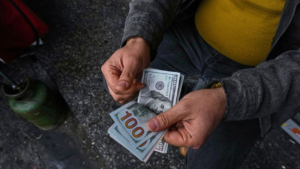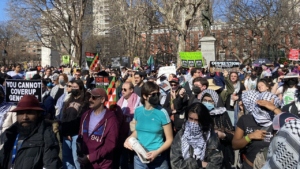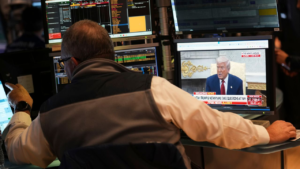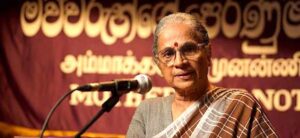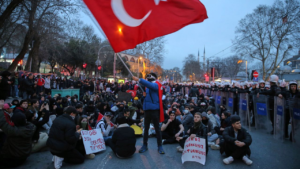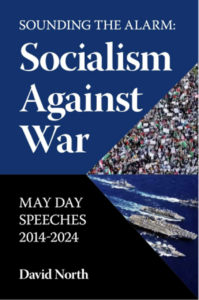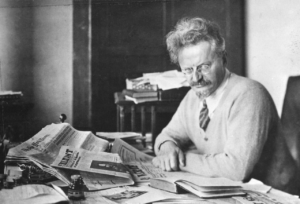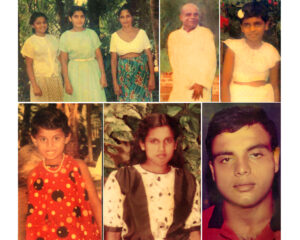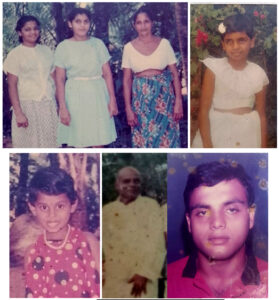By Sanjaya Jayasekera.
Pani Wijesiriwardene, the Presidential Candidate, and Deepal Jayasekara, the General Secretary of the Socialist Equality Party (SEP) of Sri Lanka, participated last Saturday morning (18th) in a state television (ITN) program hosted by Deepthi Kumara Gunarathne, an arch-enemy of the working class. The interview, a nauseating spectacle, lasted for 45 minutes and is available on YouTube.
The co-host of the program stated that the leaders of the SEP had been invited to speak on the party’s program for the presidential election to be held on September 21 this year.
The General Secretary introduced the party as the Sri Lankan section of the International Committee of the Fourth International (ICFI), summarized its historical origins, and outlined its political program. Wijesiriwardene stated that the party does not have a separate election program but is contesting this election to bring the message of the party’s international socialist program—against austerity, dictatorship, and world war—to the working class as much as possible. This highlighted their main concern for participating in this television program.
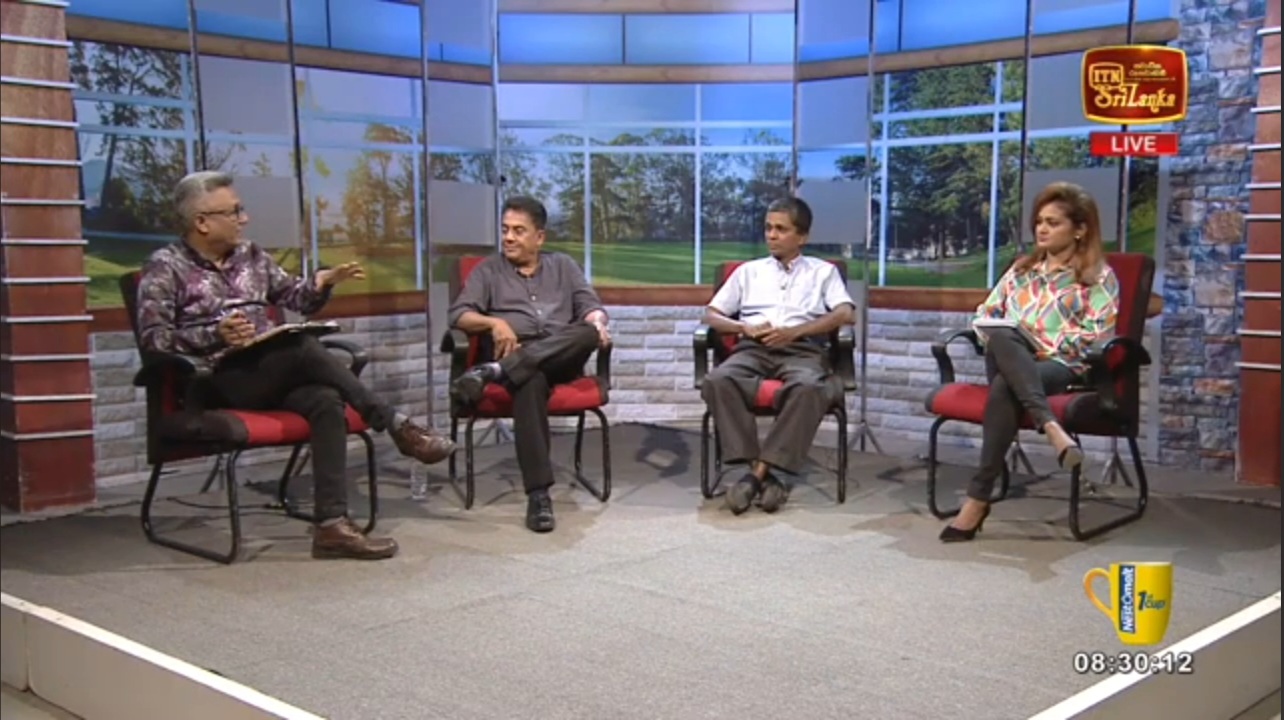
However, the SEP leaders did not merely participate in a neutral television interview. They are fully aware that the state television’s daily morning program, titled “Deepthi Samaga” (meaning ‘with Deepthi’), named after its host, is conducted by a political enemy of the program aimed at independently mobilizing the working class for international socialism. They are also aware that the ITN has given a prominent platform in this state media to Gunarathne and retained him as their host precisely because of his pro-capitalist and anti-Marxist politics, which have spanned over two and a half decades. Still, these leaders claim they were supposed to use the television program to disseminate this message to the working class in the country.
The essential question that the SEP leaders have been concealing for over twenty years from the working class, youth, and students of the country is this: Who is Deepthi Kumara Gunarathne, and what is his political tendency? Gunarathne is the godfather of an irrationalist, subjective idealist, and reactionary political tendency based on the pseudo-left ideological movement of postmodernism, which sprouted in the late 1990s and had considerable influence among university students, academics, artists, and working youth during the first and a half decade of this century. Along with several pseudo-left intellectuals, including Nirmal Ranjith Devasiri, a lecturer (now a professor) at the University of Colombo, he was a prominent leader of the “X Group,” which was based on this ideology. The group published its literature and a couple of magazines, including one named “London,” devoted to what they referred to as “cultural politics,” based on Derridian “deconstruction” and Lacanian “psychoanalysis”, and oriented primarily toward the urban middle class. After this organization dissolved in 2004, Gunarathne established a political party named the Sri Lanka Vanguard Party (SLVP), which a few years ago was converted into the “Samabima Pakshaya (SP)” (Equal Ground Party), and publishes the website 3mana.com.
Throughout this time, Gunarathne virulently opposed historical materialism and history, as well as the revolutionary potential of the working class, whose very existence he denied. At times, he has vented his wrath against the working class with fascistic rants condemning class struggles and even calling to “crush” trade unions in favor of the “oppressed” petty-bourgeoisie, portraying the former as parasites depending on the latter. He and his political movements have been vociferously inimical to Trotskyism. A lackey of capitalist pro-market parties and politicians like the late Mangala Samaraweera, Gunarathne has received and continues to receive political and financial support from them. He currently openly supports the policies of near-dictator President Ranil Wickremasinghe, endorses the tax hikes to combat what he refers to as “consumerism,” and appreciates austerity measures and privatization programs as dictated by the International Monetary Fund (IMF).
Amidst the mass struggles of April-July 2022, which Gunarathne falsely reduces to a middle-class uprising, he scathingly condemned the “people,” whom he claims do not exist, for demanding “dal and sugar,” and proposed to implement harsh and “unpopular” belt-tightening measures if the SP gained power.
The SEP’s first and last article that barely criticized Guneratne’s politics was based on a public speech he gave at a Colombo meeting in April 2014 as the leader of the SLVP. The SEP leadership wrote in the Sinhala section of the World Socialist Web Site (WSWS) as follows:
‘Gunarathna said in his speech: “There is a question about capitalism and who are the capitalists in Sri Lanka. In traditional left-wing parlance, it is the capitalists who are helping me at this time [of course]”. Gunarathne got an opportunity to work with a Sri Lankan financial capitalist, Tiran Alas. “He’s dressed and eats like a regular man. A BMW car is parked outside. But his driver is inside that car with AC on and he is having fun. In the old left language, the worker is the one who has fun with the AC on. We need to identify what capitalism really is in Sri Lanka. This system is really maintained by the oppressed.”
The essence of these statements is that there is no class that can be identified as a working class: it is the “oppressed” who maintain the capitalist system.’
The article further explains as follows:
“Gunarathne burns with hatred for modern Marxism, Trotskyism. The reason for this is that only the Trotskyist International Committee of the Fourth International (ICF) and its Socialist Equality Parties strongly defend orthodox Marxist concepts and principles, including the revolutionary potential of the working class. All other so-called leftist organizations abandoned even the pretense of having any concern for Marxism and the working class and quickly switched to the camp of the bourgeoisie with the collapse of the Soviet Union in 1991.
Gunarathne expressed his hatred thus: “Trotskyism is over today. My point is that Trotskyism is no longer a worldview for analyzing global capitalism. Trotskyism always insists on objective reality. But the problem with globalization is self-centeredness.”
The person issuing these foolish statements is ignorant not only of Trotskyism, but also of the serious analysis by the ICFI of the globalization of production.
Gunarathne is one representative of the middle class social strata absorbed by the reactionary ideologies unleashed with the globalization of capitalist production. It is not surprising that neither he nor anyone who spoke in that assembly talked about the “objective reality” – that is, the contradictions of capitalism in globalization that characterize today’s world politics, and that it is moving towards collapse and the threat of a third world war that could wipe out humanity with nuclear power. The rally’s speakers demonstrated their commitment to imperialism by spreading skepticism about the revolutionary potential of the working class and Marxism.”
The meeting referred to in the SEP article is part of a series of meetings organized by the pseudo-left Frontline Socialist Party (FSP) for a “ Dialogue of Lefts”. Wije Dias, the General Secretary of SEP, in November 2013, wrote an open letter addressed to the FSP rejecting an invitation received to participate in the said discussion.
Dias stated as follows:
“[T]he purpose of the proposed meeting is to lay the foundations for a regroupment of an array of bourgeois and petty-bourgeois organizations. Such a regroupment, were it to be realized, would result in the creation of yet another political trap for the working class. The Socialist Equality Party, which for more than 45 years has defended Trotskyist principles and fought tirelessly for the political independence of the working class, has no intention of lending credibility to the sort of reactionary regroupment that you are seeking to implement. Therefore, the Socialist Equality Party emphatically rejects your invitation.”
The party that fought so tirelessly “for the political independence of the working class” was supposed to wage a determined fight against the developing pseudo-left tendencies, as resolved by the ICFI. However, despite the growing influence of the postmodernist tendency among youth, spearheaded by the X-Group, the SEP leadership stubbornly neglected this reactionary movement, and not a single article was published “exposing” this tendency. The party leadership’s approach toward the politics of the VP and SP is the same. This omission largely paved the way for the betrayal of at least two generations of youth, intellectuals, and politically conscious advanced sections of the working class, leading to disorientation and demoralization, and driving them away from the Marxist revolutionary program advanced solely by the ICFI.
In deciding to accept Gunarathne’s invitation, it is clear that the party leadership decided to gag themselves, face to face with their class enemy, over the treacherous and reactionary role played by Guneratne in disorienting a generation of youth and the working class, which he boasts about. Having made no substantial exposure of Gunarathne’s decades-long reactionary politics, and taken no attempt to engage in polemics with the ideas of his tendency—which is the mark of a revolutionary party, as James P. Cannon once said—the party leadership had no guts to reject Gunarathne’s invitation. During the interview, Wijesiriwardene referred to the post-1991 tendencies that rejected Marxism as a “metanarrative,” advocated pluralism in epistemology, and used empiricist logic, which contributed to the erosion of “socialist culture,” but carefully avoided pointing fingers at Gunarathne, who has been one of the main culprits for this political crime.
The SEP opportunist leadership was well aware that Gunarathne, being an enemy of the working class and its struggles, would be careful not to raise the most destabilizing questions for the SEP leadership: Why was your party not able to exert at least a substantial influence in the mass struggles of 2022, let alone provide the necessary leadership for it? Why was your party not well received, even with your revolutionary program? Why did the membership of your party not grow, even during these unprecedented struggles? Challenged by these questions, the SEP leadership could not simply blame the FSP or other groups for strangling the mass struggle and channeling it toward parliamentarianism. In fact, Gunarathne had proposed such a betrayal of the struggle as early as late April 2022.
This mutual understanding marked the culmination of a shameful cohabitation. These questions, which would place the SEP leadership in trouble, have already been answered by the great leaders of our movement:
“During a revolution, i.e. when events move swiftly, a weak party can quickly grow into a mighty one provided it lucidly understands the course of the revolution and possesses staunch cadres that do not become intoxicated with phrases and are not terrorized by persecution. But such a party must be available prior to the revolution inasmuch as the process of educating the cadres requires a considerable period of time and the revolution does not afford this time”. (L.Trotsky, The Class, the Party and the Leadership, 1940).
The SEP leaders seem uninterested in finding out why Gunarathne, a class enemy and SP leader, invited them to the interview despite all his hostility to Trotskyism and the SEP, as identified in the article by the SEP. But Gunarathne knows that the tacit agreement entered into with the SEP leadership serves his ends by providing him with an opportunity to strengthen his fake left cover. In a world situation where bourgeois pundits who declared the “end of history” in the early 1990s had to admit, in the backdrop of the 2008 Great Crash, that they were wrong and that history is still ticking, and ushered in an epoch of unending war, social counter-revolution, the danger of fascism, and a resurgence of global class struggles showing a lurch toward the left by the masses around the world—which trend was demonstrated in Sri Lanka in 2022—Gunarathne and the like are gravely seeking this left camouflage to set further political traps.
During the interview, the leaders referred to a number of social problems the Sri Lankan population faces, including the effects of austerity measures and poverty. However, significantly, the leaders failed to mention the existence of the Tamil national question. This is not an accident.
While there is reference to the onslaught on democratic rights, the growing threat of world war, and the country being drawn toward the vortex of an imperialism-led war against China, the Tamil national question is not mentioned even in the SEP election statement of August 16, published on WSWS. In explaining the socialist revolutionary program to uphold what was ambiguously referred to as the “National Democratic Right of Tamils” during the first public meeting held in Colombo on August 16 as part of the election campaign, Wijesiriwardene was careful not to identify it as the eradication of national oppression, which is the essential progressive content of “self-determination.”
The SEP leadership virtually marked the end of the Tamil national question on May 18, 2009, when former president Mahinda Rajapaksha militarily crushed the Liberation Tigers of Tamil Eelam (LTTE), epitomizing their gradual subjugation of the party to the pressure of Sinhala chauvinism, diluting the concrete, practical struggle to mobilize the industrial force of the Tamil, Sinhala, and Muslim working class around transitional demands (such as the release of all Tamil political prisoners, unconditional withdrawal of the invading Sinhala military from the North and East, and full reparations and compensation for the devastated families) under the perspective of a United Socialist States of Sri Lanka and Eelam (USSLE), with the support of and as part of the struggle of the international working class. When questioned at a recent press conference about what is referred to by the word “Eelam” in the SEP’s perspective of a USSLE, Wijesiriwardene miserably failed to mention that it represented the SEP’s recognition of Tamil national oppression as a fact and those people’s right to be free from it, which could only be realized by the working class fighting unitedly across ethnic lines for such a socialist perspective.
We consider it apt to conclude this critique with the following observation by Trotsky on the failures of the leadership of the Comintern and KPD to resolve the crisis of revolutionary leadership in “German October” of 1923:
“The periods of the maximum sharpening of a revolutionary crisis are by their very nature transitory. The incongruity between a revolutionary leadership (hesitation, vacillation, temporizing in the face of the furious assault of the bourgeoisie) and the objective tasks, can lead in the course of a few weeks and even days to a catastrophe and to a loss of what took years of work to prepare…By the time the leadership succeeds in accommodating itself to the situation, the latter has already changed; the masses are in retreat and the relationship of forces worsens abruptly.” L.Trotsky, The Third International After Lenin (Pioneer Publishers, 1957, p97-98)

